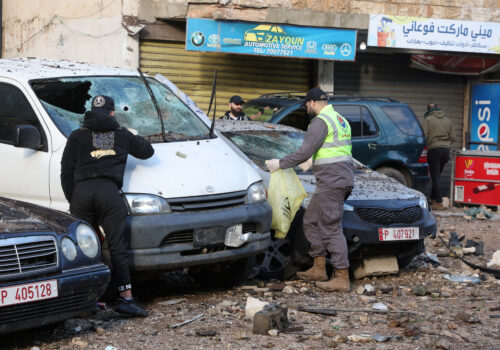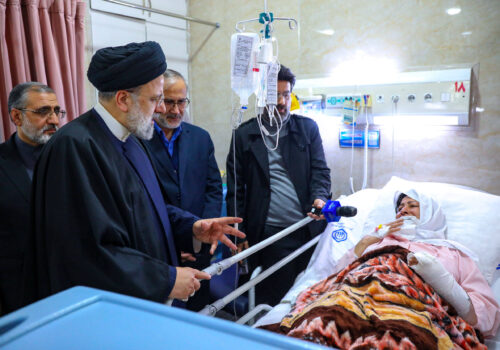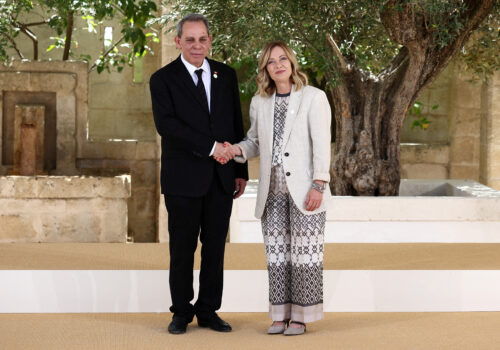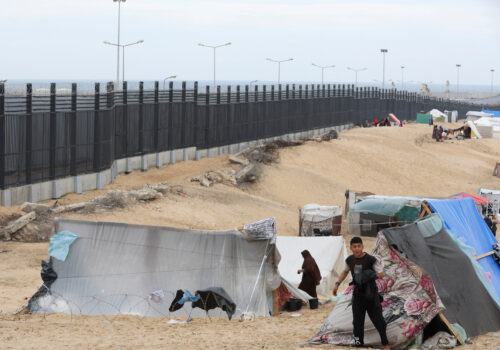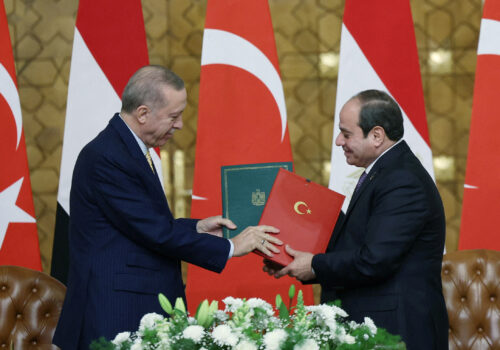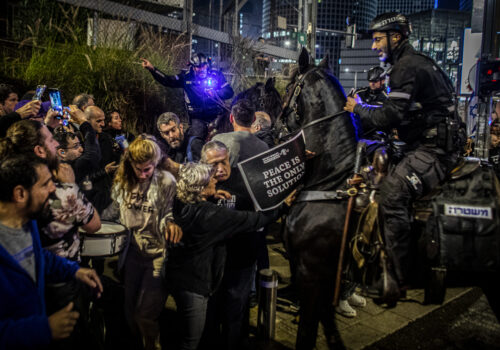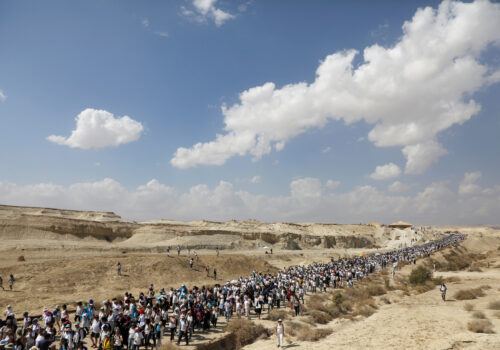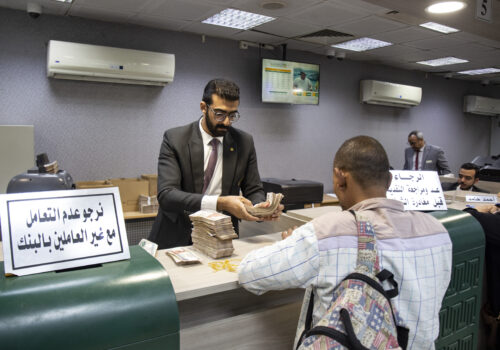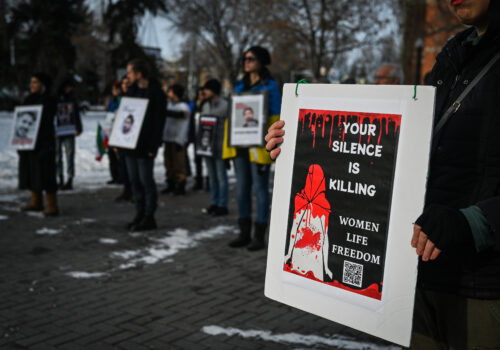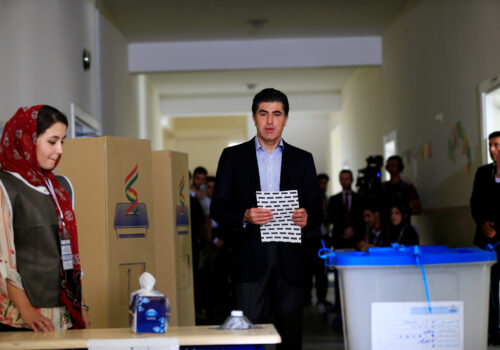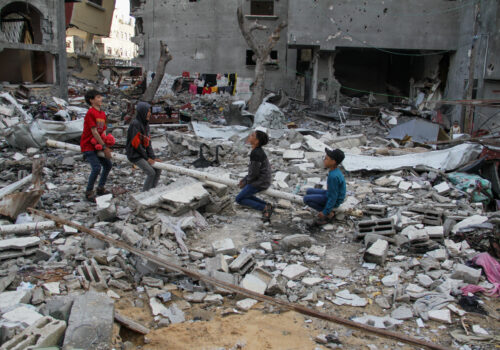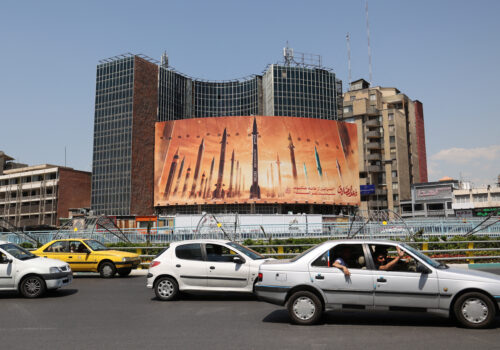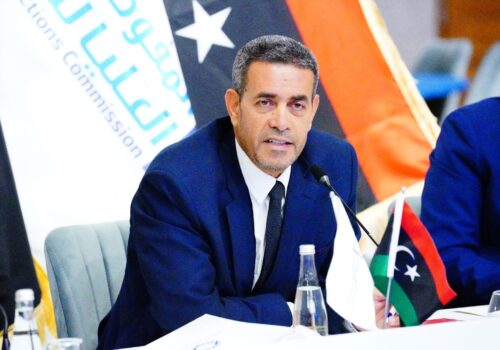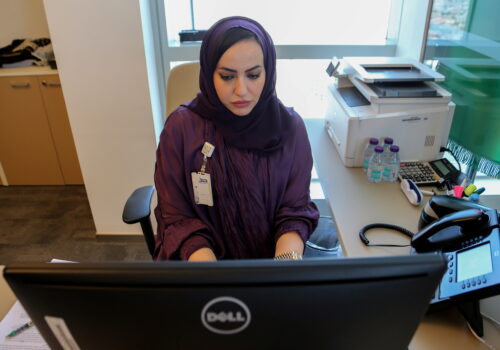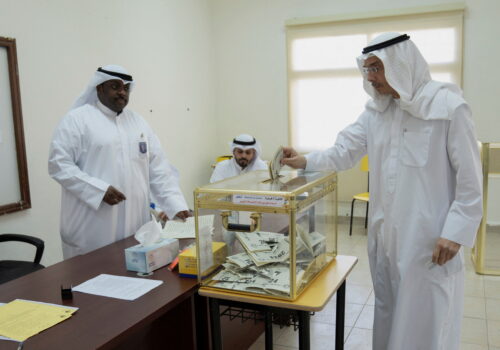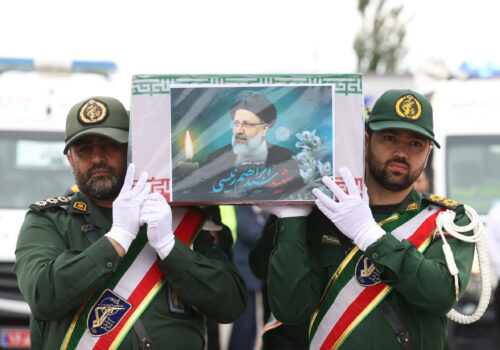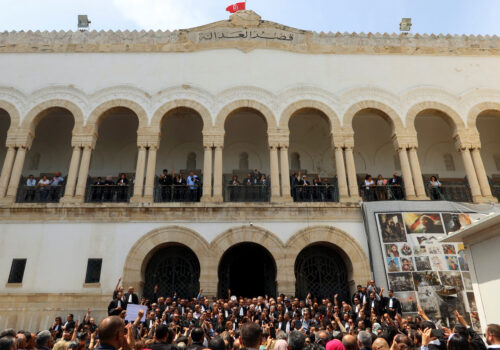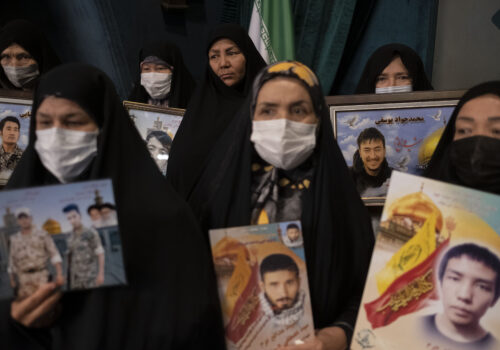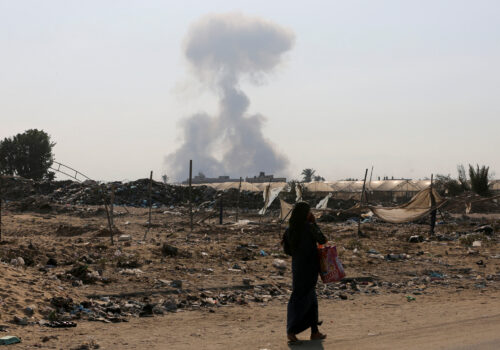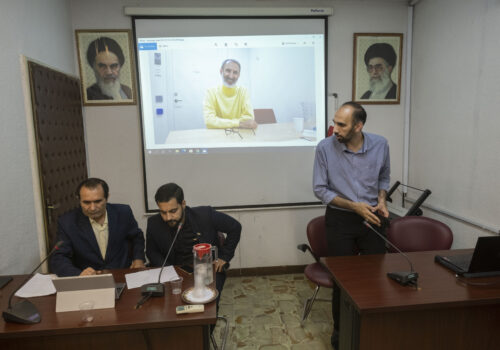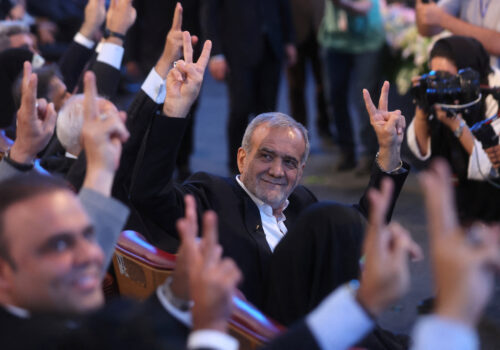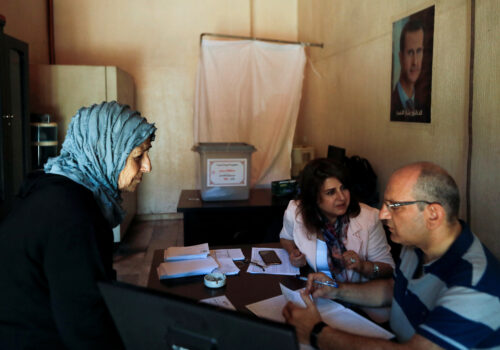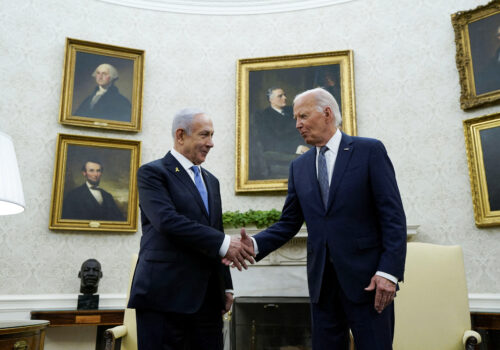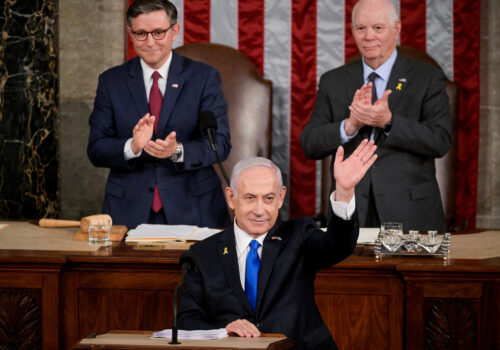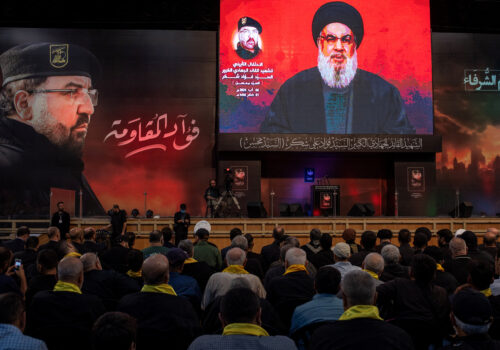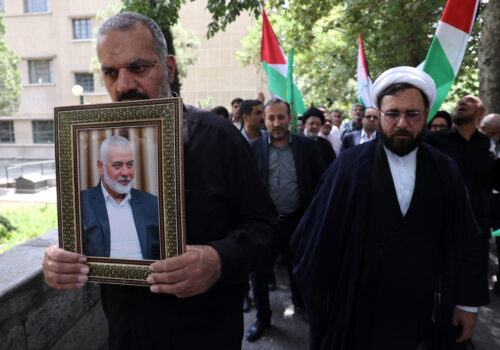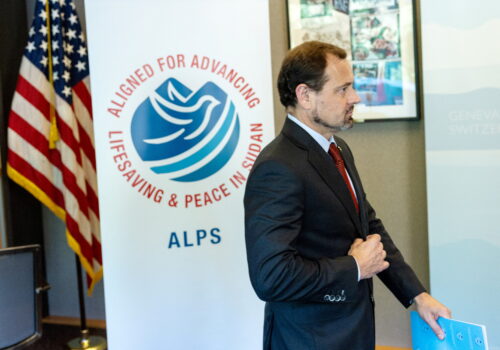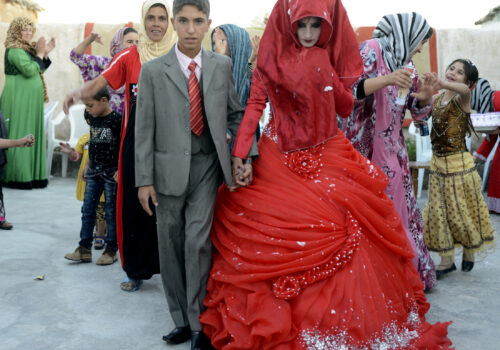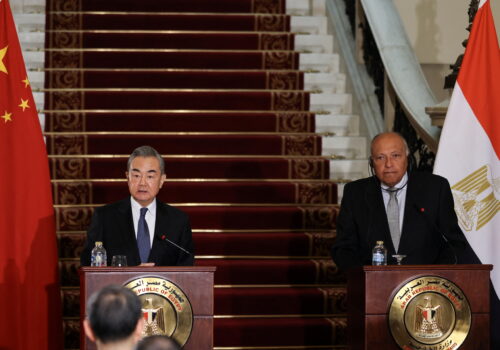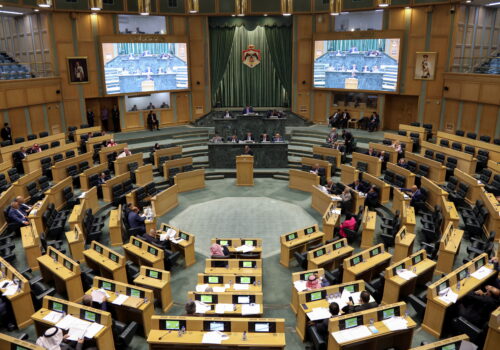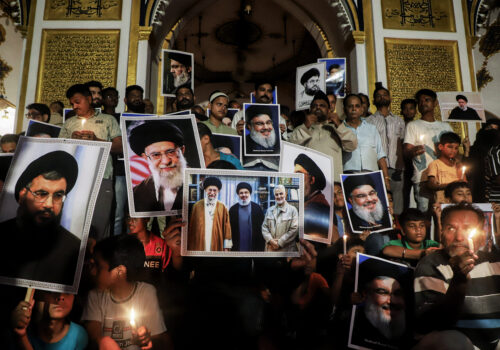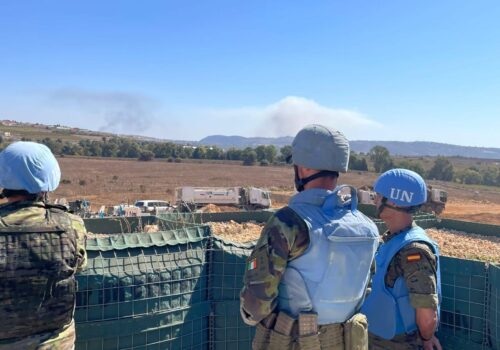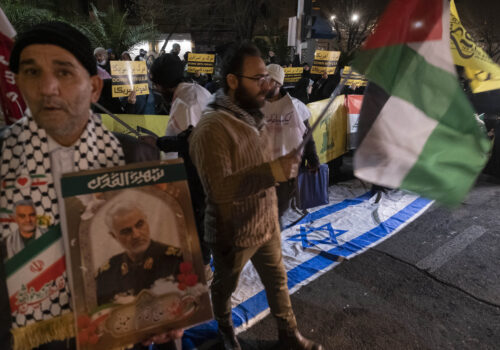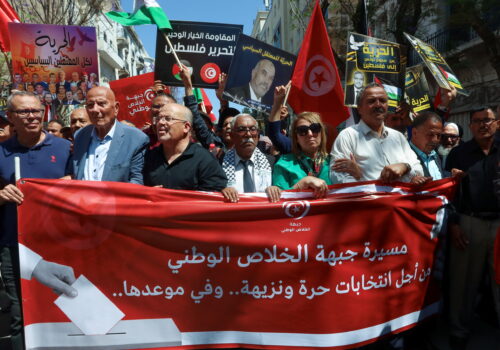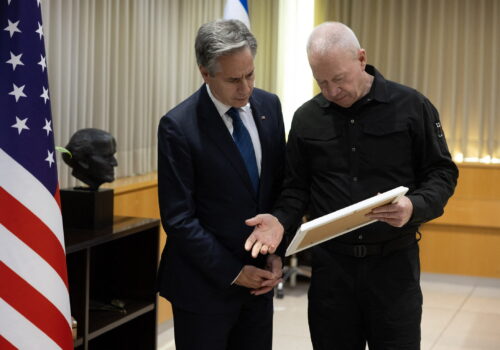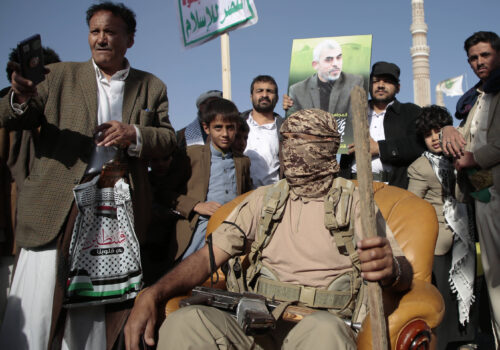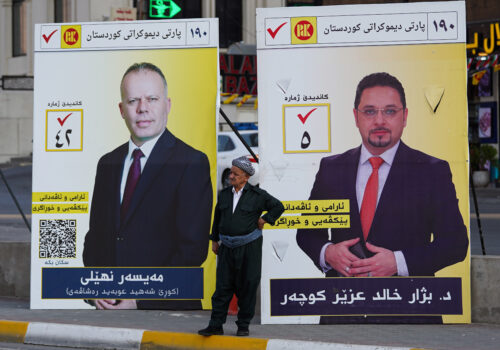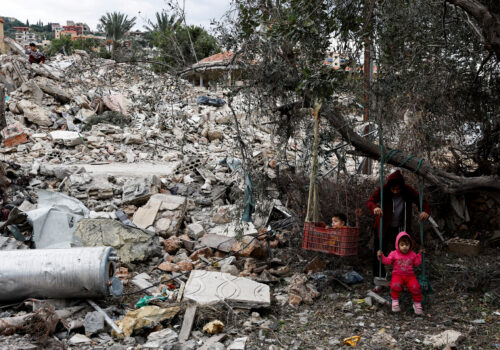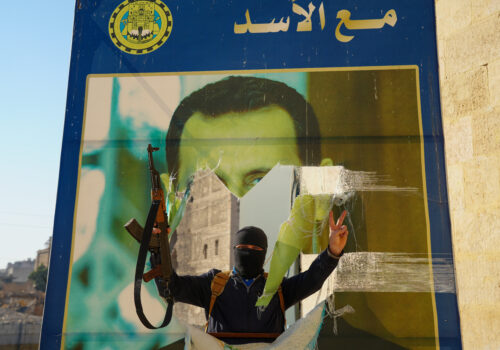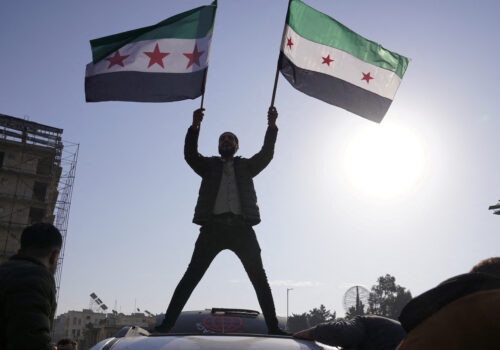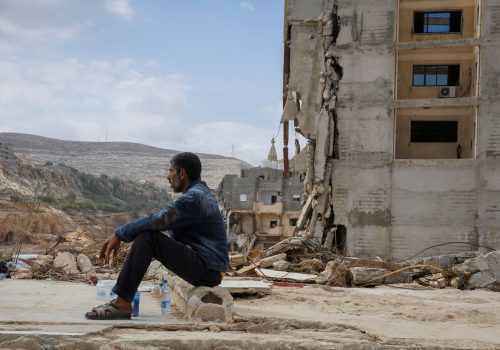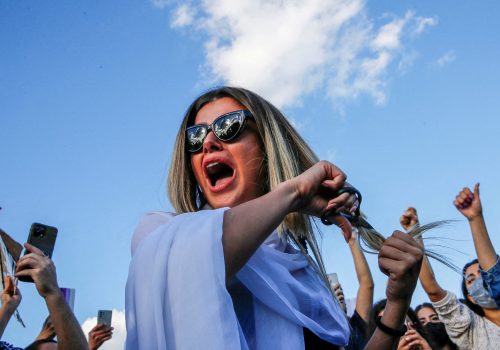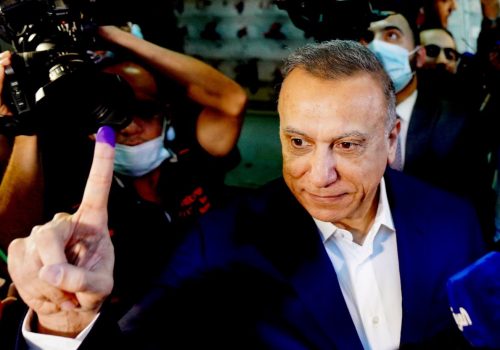2024: A year in the Middle East
2024 was a year of consequence for the Middle East and North Africa, with metastasizing conflict, human tragedies, and major geopolitical shifts. The war in Gaza ground on, with Israel taking out much of Hamas’s leadership but with significant economic, military, and human costs. Tehran’s ballistic missile attack on Israel in early October, the latter’s retaliation against Iranian military infrastructure, and Israel’s invasion of Southern Lebanon and attacks on Hezbollah targets raised concerns that the Middle East was teetering on the brink of a devastating wider regional war.
Political change was also afoot, between Libya’s rising instability and elections taking place in all of Algeria, Syria, Iran, Jordan, Kuwait, and Syria, and the year concluding in a lightning-fast offensive leading to the toppling of the Assad regime.
Catch up on the year’s biggest moments.
January 2: Israel assassinates Hamas’s Deputy Leader Saleh Al-Arouri in Beirut
As the war between Israel and Hamas continued into 2024, Israel began the year with a decisive victory: The assassination of Hamas Deputy Leader Saleh Al-Arouri, one of the linchpins of the October 7 attack, in Beirut. The attack further inflamed tensions between Israel and Hezbollah—the Iranian proxy group operating in Lebanon—amid escalating violence between the two since October 7.
Though Hezbollah leader Hassan Nasrallah vowed retribution against Israel, he is “notorious for having a much noisier bark than bite; just how loudly he will allow Hezbollah’s guns to roar over Arouri remains in question,” writes David Daoud, a senior fellow at Foundation for Defense of Democracies. Despite diplomatic attempts to establish a ceasefire, tensions would continue to escalate throughout the year, culminating in an Israeli invasion of Southern Lebanon in October.
January 3: Bombing in Kerman, Iran by ISIS-K kills 95
On January 3, Iran saw the deadliest terror attack on its soil since the 1979 Islamic Revolution, as a bombing in the city of Kerman killed nearly a hundred citizens. The attack was claimed by the Islamic State of Iraq and al-Sham (ISIS) shortly after the bombings. Iranian officials, however, were quick to shift the blame to Western countries, including the United States and Israel.
Blaming Iran’s Western opponents for the terror attack was a clear conscious decision by Iran, writes Jason Brodsky, policy director of United Against Nuclear Iran (UANI). “It seeks to capitalize on the slaughter to score propaganda points against the US and Israeli governments at a time when both are under international criticism for the Gaza war.”
January 11 – 12: US-led strikes against the Houthis
On January 11, the US military, backed by international partners, conducted limited strikes against Houthi targets in Yemen, including missile and drone storage sites, production facilities, and launch platforms. The strikes, which represented the first offensive airstrikes by the global coalition formed to protect shipping in the Red Sea, came after months of Houthi attacks on ships headed towards or from Israel, as the Houthis have pledged solidarity to Hamas since the outbreak of the Gaza War.
The goal of the strikes, writes Kirsten Fontenrose, a nonresident senior fellow at the Scowcroft Middle East Security Initiative, was to “reduce the group’s ability to destabilize the region, threaten global shipping, endanger Israel and surrounding countries with poorly planned strikes, and protect civilians on land and at sea.”
January 28-29: Mattei Plan unveiled at the Italy-Africa Summit
At a summit with African and European leaders in late January, Italian Prime Minister Giorgia Meloni unveiled the Mattei Plan—a vision for newfound political and economic relations between Italy and African countries. In her remarks, Prime Minister Meloni focused on the potential economic opportunities between Italy and North Africa, focusing on energy production and job creation in the continent, to stem migratory flows to Europe and curb North Africa’s reliance on Russian energy.
The Mattei Plan, however, represents not only an economic opportunity but also a political one, writes Karim Mezran, director of the Atlantic Council’s North Africa Initiative, as Maghreb countries have been particularly affected by great power competition and moved in recent years towards rival blocs. The Mattei Plan, as an engine for Italian diplomacy towards North Africa, represents a “political intuition to move away from today’s stagnant international cooperation policies and toward new dynamics that could produce extraordinary results if carefully implemented.”
February 9: Israeli President Netanyahu announces planned Rafah invasion
On February 9, Israeli President Benjamin Netanyahu announced a planned ground offensive in Rafah to defeat remaining Hamas strongholds in the south of the Gaza Strip, raising alarm bells both on the international stage and inside the Egyptian government. Egyptian President Abdel Fattah el-Sisi, who opposes a mass influx of Palestinians to Sinai, repeatedly stressed his objections to resettling Palestinian refugees in Egypt, even with the worsening humanitarian crisis in Gaza.
As the war between Israel and Hamas has raged, the conflict in Gaza has put the Egyptian government and Sisi himself “between a rock and a hard place,” writes Shahira Amin, a nonresident fellow with the Scowcroft Middle East Security Initiative. Regardless of his decision to allow refugees through the Rafah crossing or not, “the Egyptian president will not emerge as a winner,” as he risks being accused of either complicity in ethnic cleansing or complicity in the deaths of civilians trapped in the Gaza Strip.
February 14: Turkish President Erdoğan visits Egypt
Turkish President Recep Tayyip Erdoğan visited Egypt on February 14 for the first time in over a decade, marking a milestone in diplomatic relations between the two countries after over ten years of enmity. The governments in Cairo and Ankara have been diplomatically strained since Sisi’s rise to power in 2013, but have calmed in recent years as disputes between the two over Libya and Qatar have been resolved.
“Effectively, there was nothing left to fight about,” writes Borzou Daragahi, a nonresident senior fellow with the Scowcroft Middle East Security Initiative. He predicts that the relations between the two are likely to move into relative rapprochement, focused on energy, tourism, and business deals.
February 24: Protests in Israel met with a violent police response
On the evening of February 24, thousands of protestors in Tel Aviv demanding an end to the war in Gaza and the release of hostages were met with water cannons, detentions, and violence at the hands of the Israeli security forces. The protests, and the governmental responses, revealed a deep division within Israeli society, as many in the country see the far-right government led by Prime Minister Benjamin Netanyahu as prolonging the war in Gaza for political survival.
As various ceasefire proposals have been put forth, the issue of “Netanyahu and his government’s responsibility for the security breach that allowed October 7 to happen is of utmost importance,” writes Ksenia Svetlova, a nonresident senior fellow with the Atlantic Council’s Middle East Programs. Today, when Israel is at a crossroads regarding the possibility of a Palestinian state and normalization with Arab neighbors, “this issue is more crucial than ever before.”
March 8: On International Women’s Day, three women from the Middle East are recognized
On International Women’s Day 2024, three women from the Middle East were featured in TIME Magazine’s annual list of the most influential women. Nadia Murad, a Yazidi human rights activist, and Nobel Peace laureate, was recognized for her work advocating for survivors of genocide and sexual violence. Additionally, TIME honored the work of Yael Admi, a co-founder and leader of the Israeli movement Women Wage Peace, and Reem Hajajreh, founder and director of the Palestinian organization Women of the Sun. Despite the ongoing war in Gaza, these women have collaborated through their organizations to call for an end to the war and a sustainable resolution to the Israeli-Palestinian conflict.
The three women, writes Marcy Grossman, a nonresident senior fellow with the Atlantic Council’s Middle East Programs, “serve as powerful reminders that women are more than victims of war; they are crucial architects of lasting, peaceful solutions.”
March 17: EU announces $8.1 billion aid package to Egypt
On March 17, the European Union announced an $8.1 billion (7.4-billion euro) aid package for Egypt to curb illegal migration to the European continent. The aid package comes as part of broader financing to Egypt, including an $8 billion loan from the International Monetary Fund and $35 billion in investments from the Emirati sovereign wealth fund Abu Dhabi Developmental Holding Company.
However, the financial assistance, meant to ease the economic crisis in the country and bring economic stability, may not be effective unless Sisi’s government makes significant changes to the country’s macroeconomic policy, writes Shahira Amin, a nonresident senior fellow with the Scowcroft Middle East Security Initiative. Unless Egypt improves its social protection programs, its monetary management strategies, and human rights record, Egypt’s economy will continue to flounder, she explains.
March 18: UN Fact Finding Mission on Iran presents its findings
On March 18, the Independent International Fact-Finding Mission on the Islamic Republic of Iran (FFMI), formed to investigate human rights abuses committed during the 2022 Women, Life, Freedom protests, presented its findings to the UN Human Rights Council. The FFMI’s report revealed indiscriminate arbitrary detentions, violations of liberty and physical security, and widespread sexual and gender-based violence, with a veil of impunity for these abuses at the highest level of the Iranian state.
The FFMI’s findings reveal “the Iranian state’s widespread and violent efforts to crush dissent in the country, but they only show the surface of the deep-seated political and social crisis in Iran,” write Rose Parris Richter and Azadeh Pourzand, executive director and community director of Impact Iran. Extending the mandate of the FFMI, they argue, represents “not just a strategic necessity but a moral imperative” to truly reveal the extent of these crimes and pursue accountability and justice.
March 18: KDP announces boycott of 2024 Kurdistan elections
The political tensions between the Kurdistan Democratic Party (KDP) and the Patriotic Union of Kurdistan (PUK) came to a head on March 18, with the KDP’s announcement that it would boycott the June 2024 elections. This decision comes after the Federal Supreme Court annulled a KDP-sponsored electoral law, which increased minority-quota seats that historically favored the KDP.
“Despite their flaws, elections have been a source of legitimacy for the KDP and PUK to resolve differences peacefully,” writes Sarkawt Shamsulddin, a nonresident fellow with the Atlantic Council’s Iraq Initiative. The longer elections are delayed, the higher the risk that instability in the Kurdistan Region of Iraq will spill over to the rest of the country, as both parties are influential partners in forming the Iraqi government.
April 1: Israeli strike kills seven aid workers in Gaza
On April 1, an Israel Defense Forces (IDF) strike in Gaza killed seven members of an aid convoy run by the World Central Kitchen, a humanitarian organization operating in Gaza to deliver material assistance to civilians affected by the conflict. The deaths of the aid workers, which caused global outrage and condemnation from governments worldwide, revealed the difficulty of delivering aid in the Gaza Strip—both because of the massive scale of the needs and the physical risks of injury or death to aid workers.
Arwa Damon, a nonresident senior fellow at the Atlantic Council’s Rafik Hariri Center for the Middle East and president of the International Network for Aid, Relief, and Assistance (INARA), writes that the deaths of the World Central Kitchen members revealed the strategic issues with the process of deconfliction. “It’s a process that has never really worked in this wretched battlespace.” As any movement is fraught with dangers, it is often aid workers who are caught in the middle.
April 14: Iran attacks Israel with over 300 drones and missiles
On April 14, in response to the killing of Islamic Revolutionary Guards Corps (IRGC) commander Mohammad Reza Zahedi at the Iranian embassy in Syria on April 1, Iran attacked Israel in a massive and unprecedented drone and missile barrage, representing the most dangerous escalation between the two countries in decades and the first direct attack on Israel by Iran.
The missile strikes marked a shift from Iran’s traditional strategy towards Israel, which has historically focused on attacks through proxy groups funded by the IRGC, rather than direct military confrontation, writes Raz Zimmt, senior researcher at the Institute for National Security Studies. While Israel’s measured response to the strikes allowed the two countries to put the current round of conflict to an end, the escalation “highlights the high potential for miscalculation in the lack of direct communication channels, [which] will get even more serious if Iran decides to abandon its status as a nuclear-threshold state and turns its policy toward attaining nuclear weapons.”
April 16: United Nations Special Envoy for Libya resigns
On April 16, the head of the United Nations Support Mission in Libya (UNSMIL), Abdullah Batili, resigned, demonstrating the failure of international efforts to resolve the electoral crisis in Tripoli, as political and military leaders have fought for political power in the country. In an interview with Tahani Elmogrbi, Emad al-Sayah, the High National Election Commission chairman, spoke on the current political climate and elections in the current environment after Batili’s resignation.
“The central issue in the Libyan crisis is the political dimension, which serves as its primary source and cannot be disregarded…Currently, there is a trend of leveraging foreign interests and ambitions to maintain power, which hinders progress toward resolving the crisis. Continuing with this approach, in the absence of unified and conscientious political leadership, will exacerbate political conflicts and deepen internal divisions,” explained al-Sayah.
April 28-29: Saudi Arabia releases midway annual report on Vision 2030
On April 28th and 29th, the World Economic Forum held a special meeting on global collaboration, growth, and energy for development in Riyadh, Saudi Arabia. The event came only days after Saudi Arabia released its midway annual report on Vision 2030—the Kingdom’s agenda for economic, political, and social reform, with a special emphasis on women’s inclusion in the workforce.
The report found that there has been substantial progress regarding women’s economic inclusion, in large part due to the advancements made in women’s financial literacy and knowledge. “Since the launch of Vision 2030, economic developments have pushed women to be more independent and in control of their finances,” writes Hanaa Almoaibed, a nonresident senior fellow at the WIn fellowship. “Reforms to social welfare created more pathways out of poverty by replacing blanket subsidies with targeted support and new policies related to social insurance, social assistance, and the labor market.”
May 10: Kuwaiti Emir suspends Parliament
On May 10, Emir Sheikh Mishal al-Ahmed al-Sabah suspended Kuwait’s parliament, the latest move in a long-standing conflict between the appointed cabinet and the opposition-dominated parliament, which the emir said was obstructing Kuwait’s economic progress. This move by Sabah did not provoke significant public outcry, yet it is part of a recurring pattern of political suspensions—with no Kuwaiti parliament completing a full term since 2016. The country’s political situation has received only a muted regional and international response.
What about the United States’ reaction to the backsliding of democratic norms in Kuwait? “No public statements emerged from the White House or the US Department of State,” noted retired Ambassador Richard Le Baron, reflecting on the role of the United States in light of its past interventions in the Middle East. “This is not a fight the United States will pick. The reasons for this reticence could range from a simple lack of bandwidth to deal with what is considered a relatively minor matter in the Middle East to a more serious weighing of current priorities.”
May 19: Iranian President Ebrahim Raisi killed in helicopter crash
In May, an Iranian Air Force helicopter crashed in Azerbaijan, killing eight, including Ebrahim Raisi, Iran’s president and his minister of foreign affairs. For some Iranians, Raisi’s death sparked hushed celebration. Raisi’s death may have caused infighting within the regime in the immediate aftermath of the crash, but it did not substantially alter the policies of the Islamic Republic, as the country’s supreme leader, Ayatollah Ali Khamenei, retains tight control over the regime’s foreign policy, nuclear ambitions, and internal repression.
“At the same time, Raisi’s death has removed a potential contender for inheriting the mantle of supreme leadership after the expected demise of eighty-five-year-old Khamenei,” wrote Khosro Sayeh Isfahani. As per the constitution, the Assembly of Experts will fill the position, which again is tightly controlled by Khamenei. According to Reuters, Raisi’s name was already crossed off as a contender some six months ago in light of his incompetence and sagging popularity, reconfirming warnings that “the future leader can’t be accurately predicted—that the contenders’ list is constantly shifting, and the game is far from over.”
May 25: Tunisian President announces partial government reshuffle
Tunisian President Kais Saied announced a partial government reshuffle on May 25, replacing two ministers and creating a new post for national security, amid a crackdown on opposition and protests. The reshuffle is seen as an effort to suppress growing dissent, especially in the capital, Tunis, where opposition to Saied’s rule is intensifying. Despite growing international concern, Saied’s control over Tunisia remains firm as he prepares for the upcoming presidential elections.
“What emerges from these latest events in Tunisia is a progressive increase in President Saied’s repression of all opposition to his role and, as a consequence, further opposition to him. The events in Tunisia are taking place in front of the international community, including Western democracies, which once again show their inability to uphold actions that they support in theory: human rights and democracy,” wrote Karim Mezran, director of the Atlantic Council’s North Africa Program, and Nicola Pedde, director of the Institute for Global Studies.
June 4: Shia Afghans are being brought to Iran to make up for the lack of religious Iranians
This summer, over one hundred thousand Shia Afghans grieved alongside Iranians in the city of Mashdad’s processions for Ebrahim Raisi, the late Iranian president, making for a salient show of the rapidly growing Afghan presence in the Islamic Republic. Iran, a country of around ninety-one million, now has as many as six million Afghan migrants and, if current trends persist, will have twenty million Afghan migrants years from now. The recent surge of Shia Afghan migration to Iran has become a major topic of discussion on the Iranian street, both for the sheer scale and scope of Afghan migration into Iran and for the difficult integration process.
“Is the regime deliberately manufacturing demographic changes in Iran through migration to engineer the supreme leader’s long-held objective of achieving a so-called Islamic society?” asked Saied Golkar and Kasra Aarabi of United Against Nuclear Iran. “Migrants from Afghanistan and other Shia communities are, in many ways, the perfect candidates for Khamenei to exploit and implement his project of Islamization. The Shia Afghan community is undoubtedly more religiously conservative and observant than the increasingly secular Iranian population—and Tehran is awarding full privileges to committed Shias from Afghanistan.”
June 4: US sanctions the ICC over Israel
Following the International Criminal Court (ICC) prosecutor’s decision to file arrest warrants against Israeli Prime Minister Benjamin Netanyahu and former Defense Minister Yoav Gallant for war crimes and crimes against humanity in the Gaza Strip, the United States House of Representatives passed legislation sanctioning the ICC. The administration of US President Joe Biden opposed these sanctions, but the extraordinary political heat of the moment stirred considerable discussion about the possibility that Biden would sign the legislation and impose sanctions on the ICC.
Ibrahim Al-Assil, a senior fellow at the Middle East Institute, argued that this would be a tremendous strategic mistake. “By restraining itself from being hostile to the ICC, the Biden administration demonstrates a much-needed consistency, reinforces the rules-based order that the president champions, and enhances US credibility on the global stage. Ultimately, this aligns with core US interests in promoting global stability and upholding the principles of international law. This will also help the administration focus on what truly matters: ending the war, returning the hostages, and pushing for a two-state solution to resolve the conflict,” he explains.
June 10: UN report on war crimes by Israel and Hamas released
Hamas and Israel have committed war crimes, said the United Nations Independent International Commission of Inquiry (COI) on the Occupied Palestinian Territory, including East Jerusalem, and Israel in its June report. On October 7, Hamas militants engaged in torture; the murder of civilians, children, and the elderly; desecration of corpses; sexual violence; and hostage-taking, the COI found. It also found that Israeli forces committed war crimes of starvation as warfare, extermination, murder of civilians, forcible transfer, sexual violence, and torture.
“The COI is not a court or a tribunal, and it cannot prosecute or ensure legal accountability. However, it can issue recommendations to promote accountability and support accountability mechanisms,” wrote Elise Baker, a staff lawyer with the Atlantic Council’s Strategic Litigation Project. “While investigations and prosecutions may take years, legal accountability is essential to recovering and healing from a conflict that has resulted in months of losses and despair, retribution and atrocities. As the COI concluded: ‘The only way to stop the recurring cycles of violence…is to ensure strict adherence to international law.’”
June 15: Sweden releases Iranian war criminal in prisoner swap
In 2022, a Stockholm court sentenced Hamid Noury, a former jail guard for the Islamic Revolutionary Guard Corps, to life in prison for his role in the 1988 executions of Iranian political prisoners, a series of events across Iran over a five-month period in which thousands of prisoners, primarily political dissidents, were killed. This summer, Noury was released in exchange for two Swedish citizens, Johan Floderus and Saeed Azizi, who had been arrested in Iran on dubious charges. Noury’s release aggrieved human rights organizations, who expressed concern about the precedent that his release sets.
“In the eyes of the Islamic Republic, hostage deals lead to a simple conclusion: By taking their citizens hostage, it is possible to force Western politicians to do things they claim they would never do, especially since decisions of politicians can be swayed by [public pressure and] election contests. This is while the [Western governments] are dealing with a regime whose policies in this regard are not bound by public opinion—and it can act with absolute impunity,” wrote Khosro Sayeh Isfahani.
June 28: Iranian elections
On June 28, Iran held its first round of presidential elections following the unexpected May death of the incumbent president, Ebrahim Raisi. Iran’s Guardian Council allowed six candidates to run. Masoud Pezeshkian, who ultimately secured the presidency, was the only reformist among the six. Pezeshkian spoke out against the Nour initiative and adopted “For the sake of Iran” as a campaign hashtag, a reference to the defining anthem, “Baraye” (For the sake of), of the Women, Life, Freedom protests. This caused outside observers like US Representative Ro Khanna to say that the Pezeshkian’s election could signal political hope in Iran.
Nevertheless, “the reformist movement in the Islamic Republic has long been dead,” wrote Holly Dagres. “Elections aside, Iranians are drowning in hopelessness, prompted by multiple unsuccessful cycles of protests aimed at ending the Islamic Republic; a dire economic situation caused by systemic mismanagement, corruption, and, in part, US sanctions; and the brutal clampdowns on dissent…. The only way out of this conundrum is if Iranians take their destiny into their own hands. And if one thing is certain, it’s that their destinies will not be determined by the ballot box.”
July 15: Syrian People’s Assembly Elections
President Bashar al-Assad decreed that Syria’s parliamentary elections would occur this summer during July. Syria’s elections are administered by a dense collection of governmental and judicial organizations, in which the Supreme Judicial Elections Committee (SJEC) and its subcommittees are, at least nominally, the most important. In reality, Syrian elections are organized primarily by the Ministry of the Interior and governor-appointed civil servants who do not answer to the SJEC at all. This system is deeply complicated, according to Vladimir Pran and Maroun Sfeir, and adding to its lack of credibility in the eyes of outside observers, “candidates not running on the Baath-endorsed National Unity List have minuscule chances of being elected.”
“And while the polls were held on July 15, the elections were effectively over at the end of the primaries,” concluded Pran and Sfeir. “The candidates on the National Unity list will sit in the assembly. If there was hope for even a minor opening of political space, the regime sent a clear message: there was no interest in political reforms. Elections are only an aspect of internal Baath consolidation, and the assembly will have free rein for constitutional amendments needed to allow Bashar al-Assad to stay in office beyond 2028.”
July 22: Netanyahu visits Washington
After delivering a heated address to the US Congress the night before, Israeli Prime Minister Benjamin Netanyahu met with US President Joe Biden at the White House. There, Netanyahu made the case for unimpeded access to American weaponry and US help in preventing the imposition of international sanctions against Israel, and Biden pushed for a ceasefire, a pathway toward Palestinian statehood, and a de-escalation of tensions.
“The clock is ticking. Biden, no longer inhibited by the constraints of a re-election bid, is primed to make legacy moves and determined, by his admission, to ‘keep working to end the war in Gaza, bring home all the hostages, and bring peace and security to the Middle East and end this war.’ Caveats notwithstanding, these are all objectives that Israelis can embrace wholeheartedly,” wrote Shalom Lipner, a nonresident senior fellow at the Atlantic Council. “Given the uncertainty of what may transpire after January 20, Netanyahu—whose political legacy hangs in the balance—should hasten to roll up his sleeves, attach Israel’s wagon to Biden’s train, and pray it reaches that destination.”
July 30: Assassination of Fuad Shukr
On July 30, Israel assassinated Hezbollah military commander Fuad Shukr in Beirut. The location of the attack, combined with its timing and Shukr’s importance in the Hezbollah hierarchy, would force the group to respond, which it would later do on August 25, sending a volley of 300 rockets toward Israeli targets. In the immediate fallout of Shukr’s assassination, David Daoud closely examined a speech by Hezbollah’s then-secretary general, Hassan Nasrallah, for hints about the group’s retaliation against Israel.
“Hezbollah could also be planning to overall permanently escalate the intensity, frequency, and depth of its attacks against Israel—but keep them limited below the threshold that would justify war. This could occur only on the Lebanon front or across all ‘support fronts’ opened by the Resistance Axis,” explained David Daoud.
July 31: Ismail Haniyeh assassinated in Tehran
An air strike killed Hamas political leader Ismail Haniyeh in Tehran, one day after a rocket strike killed Hezbollah commander Fouad Shukur in Beirut. Israel reportedly launched both strikes as it continues its response to Hamas’s terrorist attack on October 7, 2023, and an apparent Hezbollah attack that killed a dozen children in the Israel-controlled Golan Heights last week.
Jonathan Panikoff notes that Iran has “always prioritized regime stability above everything else.” In this case, that means Tehran “might see the timing and targets of the assassination as an opportunity to claim retaliation while foisting the actual kinetic response off on Hezbollah and Hamas,” says Jonathan. “Iran’s, Hezbollah’s, and Hamas’s responses will drive the direction of the Middle East for the coming weeks and months.”
August 1: Famine in Sudan
In August, the Famine Review Committee concluded that North Darfur was experiencing famine, classifying parts of North Darfur, especially the Zamzam camp, in Phase 5 of the Integrated Food Security Phase Classification (IPC) system. Phase 5, “famine,” is the IPC’s highest intensity classification, denoting “an extreme lack of food and/or other basic needs even after full employment of coping strategies. Starvation, death, destitution, and extremely critical acute malnutrition levels are evident.” Almost 26 million people, half of Sudan’s population, have been battered by the hunger crisis.
“It is time for the international community to reevaluate its approach to Sudan. Any future efforts to resolve the crisis must involve the United States and its regional allies and must be guided by a rigorous analysis of regional powers’ interest in Sudan,” wrote Maha Tambal, a senior program manager at DT Institute. “This would improve the international community’s desire for a durable solution in Sudan, leading to a ceasefire agreement that ensures the flow of humanitarian aid and the protection of civilians,” she adds.
August 1: Imane Khelif polemic at the Paris Olympics
On August 1, Italian boxer Angela Carini and Algerian boxer Imane Khelif took the stage at the Summer Olympics in Paris. Forty-six seconds in, after receiving blows to her face, Carini abandoned the match and told the media that she “never felt a punch like this.” The match set off an online firestorm over the fairness of the match and sports eligibility, with prominent voices accusing Khelif of being a biological male, despite her being born a female. The story shook up discourse on gender and identity for both those in the West and the MENA region.
“Some Algerian fans, in particular, have described the West’s reaction to Khelif’s win as ‘anti-Arab,’ maintaining that Western notions of Arab womanhood remain entrenched in a profoundly Eurocentric and racist understanding. On X, Algerian cartoonist Nime posted a drawing of Khelif with her boxing shorts pulled down to reveal her pink undergarments to affirm her identity. Meanwhile, Algeria’s official football X account posted a picture of Carini at the press conference with the caption “cry more,” which has now gone viral with 59 million engagements,” wrote Yaseen Rashed, an assistant director of media and communications at the Atlantic Council’s Middle East Programs.
August 4: Iraq’s contentious marriage law
A proposed amendment to Iraq’s Personal Status Law was read in parliament in August, stoking concerns among rights groups that it could legalize child marriage by allowing girls as young as nine to wed. The amendment would enable families to choose between the current national law and sectarian interpretations based on Sunni or Shia practices, potentially legitimizing child marriage under religious law. This change risks further sectarian fragmentation of Iraq’s legal system and “jeopardizes the well-being of countless girls and boys,” argued Nibras Basitkey, an assistant director at the Atlantic Council’s empowerME Initiative.
“If enacted, the new PSL could pave the way for further modifications that deepen sectarian divides and move the country further away from a unified legal system. The potential for additional sectarian-driven legal changes could exacerbate existing tensions and hinder efforts to achieve national cohesion and stability. Passing this amendment would be an especially troubling step backward in protecting children’s rights and gender equality,” explains Basitkey.
September 4: Beijing makes inroads in North Africa at FOCAC
For years now, China’s influence has been expanding across the world, but in September, at the Ninth Annual Forum on China-Africa Cooperation Ministerial Conference, Beijing’s close ties with North Africa entered the spotlight. China has been increasingly investing in infrastructure and industry across North African countries, and its security ties have been deepening, especially with Egypt.
“North Africa is frequently described as one of the least integrated regions in the world,” wrote Jonathan Fulton, a nonresident senior fellow at the Atlantic Council. “However, when considering Chinese engagement across the Maghreb, it becomes clear how the seeds Beijing is planting today could result in intra-regional industrial chains and business clusters in the not-so-distant future.”
September 10: Jordan’s new election laws
Jordan’s September vote put all 138 seats in Jordan’s House of Representatives up for election, marking the first election since the implementation of a new law that reserved forty-one of the seats for political parties, aiming to strengthen party-based politics. However, many of Jordan’s political parties lack public trust, struggle with low voter turnout, and are heavily influenced by tribal loyalties, limiting their ability to drive meaningful change. The law also establishes specific seat allocations for women, Christians, Chechens, and Circassians, with plans to gradually increase the number of party-list seats from forty-one to ninety over the next twelve years and with ambitions of eventually establishing a parliamentary government with a popular mandate.
“Historically, most Jordanian lawmakers have been independents representing narrow concerns, a fact that has often hindered coordinated action and the advancement of broader interests. But this time around, to strengthen the country’s political parties and engage voters more effectively, the government has reserved forty-one out of the 138 seats for candidates running on party lists. Yet the resulting changes are likely only cosmetic since Jordanian parties are not winning voters’ confidence for various reasons, including on the pivotal issue of unemployment,” explains Ahmad Sharawi, a research analyst at the Foundation for Defense of Democracies.
September 27: Nasrallah’s assassination
At the end of September, Israel conducted a massive strike in the suburbs of Beirut. By the next day, the world had learned Hassan Nasrallah, the secretary-general of Hezbollah, had been killed. Nasrallah shaped Hezbollah into what it is today, guiding the organization through the post-civil-war period and countless regional wars. This leadership was made possible by Nasrallah’s personal magnetism, which drew in supporters and framed reality for his followers.
“By the nature of things, having a leader with such charisma is a double-edged sword. For the secretary-general, like all men, was mortal, and whether his death had come naturally, of old age, or—as it did—by the hands of his mortal Israeli foes, Hassan Nasrallah was slated to go the way of the world,” wrote David Daoud, a senior fellow at the Foundation for Defense of Democracies. “Now, whoever succeeds him must replace not only his administrative and organizational skills but a larger-than-life aura that the party designed. Hezbollah is doubtlessly possessed of a formidable organizational structure developed over the course of forty years, and so the death of one person is unlikely to signal its imminent destruction.” The question now is what will become of Hezbollah.
October 1: Israel invades Southern Lebanon
On October 1, the war in the Middle East expanded. Israeli troops entered Lebanon seeking to find and destroy Hezbollah’s military infrastructure. The move came only days after Israel assassinated Hezbollah’s secretary-general, Hassan Nasrallah, on September 27, sparking concerns that the Middle East was on the brink of an all-out regional war.
On October 1 of this year, Israeli troops returned to south Lebanon for the first time in eighteen years—the latest phase in a year-long conflict that has escalated steadily over this past month. This time, however, “the Israeli army appears to have absorbed some of the lessons of its troubled 2006 experience fighting against Hezbollah,” wrote Nicholas Blanford, a nonresident senior fellow at the Atlantic Council, in his reflection on the move and on the lessons Israel may have learned from its previous invasions of Lebanon.
October 7: First anniversary of the October 7 attacks
Last year, Hamas launched a series of attacks on Israel, killing 1,200 and taking hundreds as hostages. In response, Israel launched airstrikes and a ground invasion of Gaza, with the war quickly plunging thousands into a state of humanitarian catastrophe. The war has been at the center of virtually all regional discussions, and in October of this year, experts from the Atlantic Council, from a variety of humanitarian, international law, political, and security perspectives, contributed to an anniversary special series, reflecting on the legacy of the attacks.
“In addition to the unprecedented pain that Israelis and Palestinians have been experiencing, there are few prospects on the horizon for an end to the war, increasing the likelihood that this exceptionally bloody chapter will extend into 2025,” wrote Ahmed Alkhatib, a resident senior fellow at the Atlantic Council. “The death and destruction in Gaza are the worst chapter in Palestinian living memory, something that will take significant time to heal from. Nevertheless, this war can, should, and must be Gaza’s last.”
October 6: Tunisian presidential election
Tunisian President Kais Saied won re-election in a landslide this October, securing a landslide victory with 90.7% of the vote. Saied’s competitors were few. His primary challengers were imprisoned or kept from the ballot, and the opposition parties largely boycotted the election entirely. The election marked the first since Saied rewrote the constitution in 2021 to extend his presidential powers and authority. Tunisia has been criticized for its handling of sub-Saharan migrants and a crackdown on media outlets and civil society.
“In addition to controlling all branches of government directly or indirectly, Saied is cementing his power grab by clamping down on opposition party members, critics, independent media outlets, and civil society,” wrote Alissa Pavia, an associate director at the Atlantic Council’s North Africa Program. “While the elections may seem like a legitimate democratic exercise, the context in which they are held is nothing short of an authoritarian regime, whose control over the state apparatuses is becoming more and more evident. This erosion of democratic norms undermines Tunisia’s hard-won democratic gains and is pushing the country further into autocracy.”
October 16: Yahya Sinwar killed
Yahya Sinwar, the leader of Hamas credited with planning the October 7 attacks, was killed by the Israel Defense Force’s 828th Bislamach Brigade in Rafah on October 16. His death was a key achievement for Israel, whose president, Benjamin Netanyahu, has stressed the importance of eliminating Hamas leadership, and it therefore brought up questions about if or how the war in Gaza might come to an end.
“US officials hope fervently that Sinwar’s passing could be an inflection point, one in which Israel uses his death to its diplomatic advantage by securing the release of Israeli hostages via a Gaza ceasefire agreement,” wrote Frederic Hof, a senior fellow at Bard College’s Center for Civic Engagement.
October 20: Kurdistan elections
Kurdistan’s long-delayed elections took place on October 20, following years of disputes between the two dominant parties, the Kurdistan Democratic Party (KDP) and the Patriotic Union of Kurdistan (PUK). Originally scheduled for 2022, the vote was postponed due to disagreements over the electoral system and the collapse of the duopoly’s power-sharing agreement. The KDP has gained strength in recent years, while the PUK faces internal challenges and competition from a new opposition party, the People’s Front, led by Lahur Talabani. Voter apathy is high due to economic dissatisfaction and political stagnation, and the election outcome may lead to prolonged government deadlock and instability in the region.
“The general public’s mood is one of apathy and weariness. Voters do not seem eager, and overall disenchantment with politics has risen. People’s living conditions have deteriorated over the last decade, and the government has often been unable to make payroll. The turnout rate will likely be low as the opposition parties struggle to sway undecided voters,” said Shivan Fazil in advance of the election.
November 27: Lebanon-Israel ceasefire announced
A fragile ceasefire took effect on November 27, ending the thirteen-month conflict between Hezbollah and Israel prompted by the October 7, 2023, attack. The thirteen-point ceasefire plan brokered by the United States and France calls for the Lebanese Armed Forces (LAF) to deploy into the southern border district and for the IDF to withdraw from Lebanese territory within sixty days.
Nicholas Blanford, a nonresident senior fellow with the Atlantic Council’s Middle East programs, explains how the fragile ceasefire has been violated multiple times since coming into effect. “A week after the ceasefire began, it is evident that the security paradigm of mutual deterrence between Hezbollah and Israel, which led to a tense calm for seventeen years along the Lebanon-Israel border, is all but over. Where Israel was once hesitant to take action against Hezbollah in case it triggered an escalation of unwanted cross-border violence, the calculus has mostly swung the opposite way. Israel’s post-ceasefire shelling and air strikes indicate that it will police the agreement by fire, irrespective of any response by Hezbollah,” explains Blanford.
December 8: Rebels in Syria topple the Assad regime
Syrian rebel groups took control of the capital after a lightning-fast 10-day offensive across the country. Dictator Bashar al-Assad abdicated power and fled Syria, according to Russian officials. Key among the opposition factions that led the offensive is Hayat Tahrir al-Sham (HTS), which is designated as a terrorist organization by the United States and the UN, led by Ahmed Al-Sharaa, a Syrian revolutionary militant with former ties with Al-Qaeda and ISIS.
“Ankara realized that it could not persuade Damascus to join negotiations regarding a political solution in Syria. As a result, it decided to give the Syrian rebels the greenlight for which they had been waiting. As soon as a ceasefire in Lebanon was announced on November 27, the rebels promptly launched their offensive. Syrian rebels saw their opportunity to advance as Iran weakened in Syria and Hezbollah focused on Lebanon without being accused of collaboration with Israel,” explains Ömer Özkizilcik, a nonresident fellow at the Syria Project.
Leila Ouhri is a Young Global Professional with the Middle East Programs at the Atlantic Council.
Kate Springs is a Young Global Professional with the Middle East Programs at the Atlantic Council.
Yaseen Rashed is an assistant director of media and communications at the Atlantic Council’s Middle East Programs.
Further reading
Mon, Dec 18, 2023
2023: A year in the Middle East
MENASource By
2023 was a tumultuous and tragic year for the Middle East and North Africa. It also produced moments of hope and diplomatic feats.
Fri, Dec 23, 2022
2022: A year in the Middle East
MENASource By
2022 was a year full of unprecedented protests, groundbreaking state visits, historical elections, and new challenges for the Middle East and North Africa.
Fri, Dec 17, 2021
2021: A year in the Middle East
MENASource By Holly Dagres
2021 was a year full of impactful elections, historic anniversaries, and new challenges for the Middle East and North Africa.
Image: Palestinians, including the elderly and children, leave the northern Gaza Strip on foot to seek refuge in the south as Israeli tanks roll deeper into the enclave amid the conflict between Israel and Hamas, in central Gaza, November 10, 2023. REUTERS/Ibraheem Abu Mustafa Pulitzer Prize Winner for Breaking News Photography
